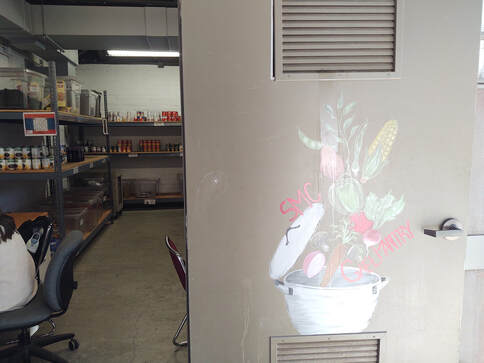|
College students face plenty of challenges. An empty belly shouldn’t be one of them. (Image c/o writer) Andrea Madison American Journalism Student As reports of aftershocks from the COVID-19 pandemic wind down, Americans continue to grapple with inflated costs of consumer goods, including groceries.
The U.S. Department of Agriculture’s Economic Research Service reports that grocery and supermarket costs for Sept. 2023 are 2.4 percent higher than costs last year, and while prices have been expected to grow at a slower rate this year than in 2022, they remain at above-historical rates. Saint Mary’s Justice, Community and Leadership major and junior Katie Marcel is acutely aware of the food insecurity issues facing the college community. “When talking with other students, I do hear struggles about food,” she said, “From the cost to the limited access.” Between the two spots on campus to purchase food, neither are cheap options, said Marcel, and while fast food may be cheaper, time and health costs must be taken into consideration. The issue is compounded when a student commutes to campus, as she does, Marcel continued. That cost is added to the mix of attendance and food expenses. “It feels like there is an extra challenge” when it comes to procuring nutritious food, she said. Bringing meals from home requires advance planning and finding food that is both healthy and affordable is another struggle, she said. “It seems as if I lose [healthwise] if I try to get cheap, but then I lose financially if I try to eat healthier.” The Mission and Ministry Center (MMC) at Saint Mary’s College offers support to students worried about their next meal with an on-campus food pantry and free hot meals. The SMC Legacy Garden, managed by the Office of Sustainability, is another resource, with fresh produce from the garden given to volunteers, most of whom are students, according to SMC Sustainability Director Ann Drevno. Solidarity Suppers are held in the MMC Fountain Courtyard once a month, with the next set for November 15th from 5:00 to 6:00 p.m. GaelPantry has been an on-campus resource for students facing food insecurity since 2016. Coordinator Daniel McCarthy, also a graduate student and 2020 alumni, has witnessed an uptick in food insecurity within the campus community since he began his position this year. “In terms of even summer numbers, the number of people who came in this summer, compared to last summer, tripled,” said McCarthy. While visits were higher over the summer, a steady increase in visitors to the pantry has continued, he said. “I think people are feeling the need.” Jeremy Crittenden, spokesperson for the Food Bank of Contra Costa and Solano, attested to the growing need, especially in the last two years. “People are struggling in our community,” said Crittenden. In the past eight months, the need addressed by the food bank has grown from 350,000 to 465,000 people per month currently, he said. Crittenden emphasized the food bank’s mission to support those facing food insecurity. “We want to make sure that you use the money you have to be able to support the things that you need to,” said Crittenden, such as school needs or doctor appointments. At GaelPantry, non-perishable foods, such as soups, canned fruits and vegetables, beans, dried pasta, canned chicken and tuna, granola bars, and peanut butter and jelly are staples, said McCarthy. Some fresh produce arrives weekly through a partnership with Good Eating Company. GaelPantry also has a partnership with the Food Bank of Contra Costa and Solano and orders food through the organization. Other resources, such as drives through local high schools and private donations, keep the shelves stocked. The pantry is a free resource for undergraduate and graduate students living on or off campus, operating on a point system. Every student has ten points to use each week, with items varying in value. Located at the back of the Soda Center, the pantry is open Mondays and Wednesdays, 1:00 to 3:00 p.m. and Tuesdays and Thursdays, 6:00 to 8:00 p.m. Students can also make appointments for a visit by emailing the Mission and Ministry Center at mmc@stmarys-ca.edu. Students whose need exceeds the ten-point limit can reach out to Carrie Davis, director of the Mission and Ministry Center, at cak6@stmarys-ca.edu. Those who would like to donate food to the GaelPantry can email McCarthy (dpm9@stmarys-ca.edu) or the SMC Mission and Ministry Center. Most donations are accepted and incorporated into the pantry’s offerings, said McCarthy. Marcel highlighted the importance of awareness for both on- and off-campus students when it comes to food resources at SMC. “It’s definitely a hard obstacle to tackle, as an individual and as a college.”
0 Comments
Leave a Reply. |
STAFFMadison Sciba '24, |

